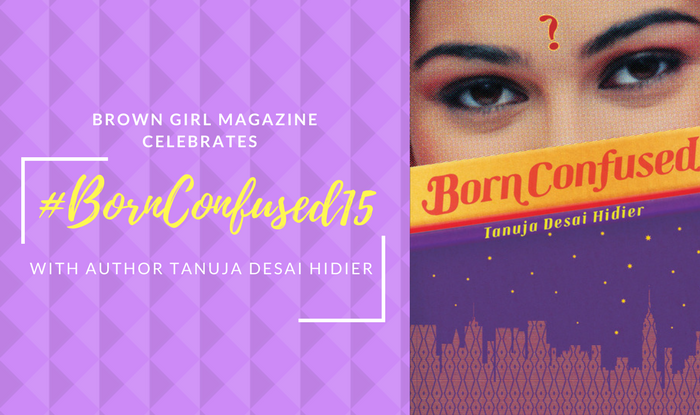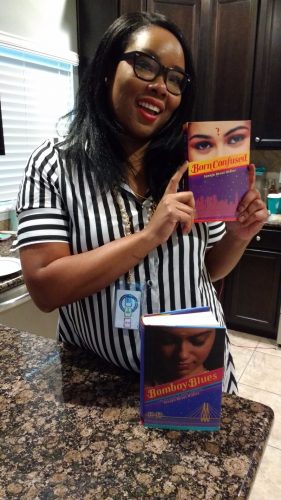
The following post is part of an ongoing series by writers/authors in celebration of the 15th anniversary of the publication of Tanuja Desai Hidier’s landmark novel Born Confused, which is considered to the first ever South Asian American young adult novel (and in part inspired the creation of Brown Girl Magazine!)… as well as the 15th real-time birthday of Born Confused and award-winning sequel Bombay Blues heroine Dimple Lala. #BornConfused15
Born Confused has served as a beacon of awesomeness and a lighthouse for brown girls who are confused, feeling other-ed and just trying to make sense of it all.
Born Confused came on the scene in 2002, which was a tumultuous time. A time when brown girls from New Jersey to California were catching hell in classrooms and playgrounds…and were nearly nonexistent in American media. Fear surrounding girls like Dimple heightened in the aftermath of the September 11th attacks. Regardless of what country you came from, your religion, or your cultural identity—if you were brown you were at risk of any manner of hate, suspicion, and ignorance. And though this kind of evil existed before September 11 and still persists with ever-growing fervor today—we needed girls like Dimple who were living life, making mistakes, being insecure, needing love, and trying to figure it out.
We needed a heroine who wasn’t perfect, who didn’t have it all together, who was very American and very Indian and who was giving voice to an ignored demographic. Dimple Lala came through to be real, relatable, funny as hell…and pioneered a South Asian girl being the protagonist in a young adult novel.
It is 2017. Fifteen years on, we still need more Indian, more South Asian girls, more brown girls, more girls of color, more girls from all backgrounds in books, movies, television, and media. We need them in fantasy, science fiction, literature, romance, and graphic novels. We need more writers who are able to write truthfully and fearlessly about their experience. We still need more diverse books.
As an African-American brown girl from New Jersey, and a long-time friend of well-written books and quirky characters—I loved Dimple. Her story was fresh yet familiar. Dimple shopped at the mall, had boyfriends, and snuck out drinking—typical teenage behavior.
As a socially awkward teen who hadn’t even been kissed well into my college experience—I lived vicariously through the heroines of my books. I was a mall and diner connoisseur. I navigated my world with both curiosity and caution. And though my parents are not immigrants, I could relate to wanting to live up to their standards and feeling a clash between their very strict and conservative ideal of how I should be versus who I actually was. Like most teenagers, Dimple wanted to cultivate her own identity yet she still wanted to be a good daughter. Dimple was like me. She was just a girl trying to find her place in the world.
A hallmark of good fiction is that facilitates a journey to the common ground. And this book did that for me. With a healthy dose of heart to keep me engaged with Dimple and her witty thoughts about her world.
A theme of the book that still stands out to me is the universal one of being and feeling enough. For Dimple, it was whether she was Indian enough or American enough. In one passage she says, of her India-raised cousin Kavita:
“…if she herself had wondered whether she was Indian enough—she, who had always been to me a sort o the epitome of Indian—then who could be? Who could claim the sole right or way to an identity?”
In almost every non-white community the question of where you are maintaining “enough” of your cultural identity is nearly always at play. A way of seeing oneself through the eyes of another culture and then using demerits against yourself. This can come both internally and externally.
Am I enough? Do I feel disconnected from others who share my hue/language/country of origin/ethnicity/what-have-you? Part of Dimple’s journey is learning to accept herself. Learning that she is enough. That her experiences, her friends, her family—as for the reader—are all influencing and blending together to make her more than enough.
This 15th anniversary of Born Confused and Dimple Lala may be a good time for me to re-read this book and examine how I experienced it then, and what else has stayed with me all this time. I’m sure I’ll be able to look back and see the ways in which Dimple has inspired new books written about the Indian-American experience. She has certainly inspired me to write with passion, bravery, authenticity, and wisdom.
[su_divider]
 Christina Vortia is a librarian, contributor at Book Riot, and book reviewer for School Library Journal. She is on the 2017 Michael L. Printz Committee and the 2019/2020 Coretta Scott King Book Awards Jury.
Christina Vortia is a librarian, contributor at Book Riot, and book reviewer for School Library Journal. She is on the 2017 Michael L. Printz Committee and the 2019/2020 Coretta Scott King Book Awards Jury.




